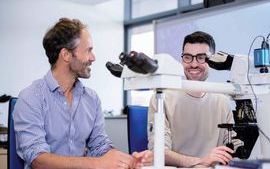- Published:
- 22 April 2025
- Author:
- Sophie Roberts
- Read time:
- 15 Mins
The College Trainees' Advisory Committee is dedicated to representing the interests of trainees entering their careers as pathologists. This article discusses 5 key challenges facing pathology trainees and highlights the features of excellent training as examples of our vision for the future of pathology training.
The Royal College of Pathologists has a particularly wide scope of specialties under its umbrella. While these specialties broadly encompass laboratory medicine, the daily experiences of the doctors and clinical scientists within them are markedly variable. This is further compounded by the exponential expansion of knowledge within each specialty over the past few decades, leading to diverging developments in training and curricula – this diverse cohort is precisely what gives the College strength. Unsurprisingly, within this diversity, there is extensive common ground between specialties in terms of shared goals and challenges that we can all work towards together.
Improving training for all trainees
The Trainees' Advisory Committee (TAC), run by and for trainees and clinical scientist trainees, aims to achieve these shared goals and give time to specialty-specific issues as well. This requires a diverse range of perspectives, with Chair and College oversight.
It will be no surprise to doctors and clinical scientists reading this that recently, for the majority of us, pathology is in a more challenging position. Consistent underfunding – coupled with an overwhelming volume of work – has made day-to-day work and training more difficult. Trainers are being asked to do more, with less time allocated for this. Trainees are being asked to develop more nuanced and complex competencies in an environment that can make facilitating this development challenging.
I hope that sharing of the experiences of TAC members, coupled with my own commentary, may be useful in stimulating further discussions at all levels on the ways in which we can work together to improve training for all. Where do we go from here, then?
UK resident doctor salaries have not kept up with inflation. The recent work from the BMA around pay restoration, combined with the lengthy strikes in England and the passion seen at local and national meetings regarding pay, has cemented this issue as one of trainees' most important national concerns over the past few years. The associated costs of medicine, such as travel, conferences and courses, continue to be raised at every level by doctors as an unacceptable level of expense.
Trainees are clear regarding their vision for costs of training: core costs necessary for training should be covered by training; pay should be commensurate with work completed; and trainees should not be financially disadvantaged because of their training. For example, members of the TAC fed back that:
Understandably, this is difficult to solve. In the past, it has been all too common either for trainees to shoulder the burden of cost, or for consultants to provide extensive amounts of free work and time. Neither of these are the best solution to this challenge, particularly with rising rates of burnout. Some national-level pay initiatives can, and have, driven forward improvement in this domain. However, it is important to also consider how we in pathology can continue to improve this issue for trainees.
Collaboration and consideration of shared costs is one way in which these issues can be addressed. For example, in Scotland, within histopathology, the regions collaborate frequently on teaching and training. There is an ST1 introductory course, an ST1/2 weekly teaching course, a cervical cytology teaching course run in Glasgow and a neuropathology teaching course run in Edinburgh that all Scottish histopathology trainees can attend. There is then a conference once per year, rotating around Scotland, where trainees can learn from experts all across Scotland and present in person.
Similarly, within microbiology training, initiatives are developing that may also reduce the burden of cost for trainees.
A multi-region approach, with appropriate buy-in and remuneration, is an excellent way to reduce costs associated with course attendance. Trainees informally report that they enjoy these courses and find it useful to meet and work with trainees in other areas. However, initiatives like these have multiple pitfalls that need to be fully considered. Local and national consideration of remuneration needs to continue, so that those running and contributing to these courses are not doing so at a personal loss or by staying late to complete other work. Otherwise, there is a definite and important risk of burnout for educators. Furthermore, there is a risk of imbalanced funding between areas such that there is no shared burden of cost.
While these are only some examples, they show the principle of how we may tackle the burden of cost of training and, provide an excellent training experience without breaking the bank for trainees.
Our second training challenge focuses on access to high-quality, timely and detailed training opportunities. This is an area in which there is already great success; training in the pathology specialties continues to be highly rated within the related GMC training surveys. However, with the evolving landscape of consultant and clinical scientist practice within the UK, some important issues continue to arise.
Trainee-led initiatives
Frequently, entry and exit from training – where there is a graded adjustment of responsibility – are key transition points where these issues tend to arise. No matter the medical specialty, this progression is difficult for trainees, and there is extensive literature on how we can better tackle these transition points. Some examples of trainee-led and trainee-focused initiatives for this include collaborative introductory lectures for all trainees to help with the transition into laboratory medicine and training days for specific regions. The Pathology Portal has been used in some specialties to facilitate this, too. It is an area that is perhaps fruitful for national, College-supported initiatives to improve these transition point experiences further.
Post-mortem examinations are consistently one of the most raised issues within all histopathology specialties. In an environment where there are fewer and fewer post-mortem examinations, with increasing use of CT scanning and centralisation of services in areas, this will continue to be an issue that requires innovative solutions.
While there are local/regional agreements and plans in place, these are not without issues, particularly financial ones. This is something that has been, and continues to be, raised and considered at TAC meetings and will continue to be a priority for TAC representatives for histopathology-associated specialties. See the articles in this issue from Dr Erin Whyte and Dr Esther Youd for more reflections on autopsy training.
There are 2 components to this third challenge: recruitment into specialties (with exposure at undergraduate and foundation level as a determinant of interest) and exposure to areas within a specialty that may be traditionally underrepresented. Several TAC members discuss this issue below.
Increasing awareness of smaller specialties
There are similar principles across the different specialties. Principally, there is a lack of recognition of laboratory medicine specialties at medical school/foundation level that in the past has translated into these specialties not being considered as career options. Recent years have seen a great improvement in the numbers of applicants to pathology specialty training, in almost all specialties, coinciding with several RCPath initiatives, including the RCPath Foundation Fellowship scheme, the RCPath medical electives small grant scheme, Pathology Summer School and the annual College Taster Event, undergraduate and foundation essay prizes and the introduction of Longitudinal Integrated Foundation Training in pathology in some regions. Currently, we are in a newly turbulent time within postgraduate recruitment, with exponential increases in training applications, so this picture may evolve further over the next few years. Regardless, particularly for the smaller specialties within pathology, there is still a role for increased awareness, focus and recruitment drives.
We love our specialties and we can showcase them well to students. This is where the College diversity and influence can be a true strength of our profession.
We are at a time where clinical commitments are expanding, training time is being reduced and specific time for consultants to train (e.g. SPA time) is being curtailed. We are at a crossroads, where the choices made at a national level, driven by our activism, will determine the route for training going forward. Excellent training requires time for learning and processing, and dedicated time for trainers to teach properly. TAC members highlight some of the current challenges and possible solutions in this regard.
Interdependent issues
A further important point is appropriate psychological support for trainees (and realistically for consultant and clinical scientist staff as well). This is an area in which we can learn from other specialties, such as psychiatry training, how to effectively support our staff. Balint groups are one such example of effective group-structured psychological support. Originally designed as a method of discussing the psychological aspects of a case, they have been trialled in areas of pathology as a way of discussing the human factors associated with laboratory cases and the effect these have on the individual presenting cases.
Other specialties have had some success with methods such as mindfulness sessions, Therapets or rest/relaxation hubs. There is a fine balance between effective psychological support and conflating systemic issues with individual responsibility. However, the principle of including appropriate psychological support within training deserves further consideration.
Finally, with an increasingly diverse workforce that is undertaking additional research, teaching and leadership roles, consideration of diversity within our training spaces is especially important. For example, TAC members have commented:
The College has been working on these issues for the past few years through their Equality, Diversity and Inclusion (EDI) Network and through the work of TAC members. For example, the EDI Network spearheaded work on removal of stereotypes from College examination questions and considerations of indirect discrimination in the College fees structure, directly tackling EDI issues affecting training and assessment. While this is only the beginning, it highlights how these issues can be tackled effectively at a national level with effective organisation within the College.
It can be difficult to strike the balance between the provision of clinical care, learning for postgraduate professional exams, meeting clinical curriculum competencies, undertaking research and maintaining morale during a cost-of-living crisis. However, there is hope. Many of us are in the same boat, navigating the same troublesome seas, and our colleagues are constantly throwing us lifelines in support.
If you are struggling with some of the problems highlighted in this article, speak to your colleagues or contact your TAC representative. Support and help are available. You are not alone.
To trainees, trainers and the wider readership, I hope it is clear that these challenges, while difficult, are not insurmountable. As I said at the beginning of this article, it is through our unified strength that we can tackle these challenges and lead pathology training to the bright and evolving vision of a better tomorrow. Sure enough, the next generation of trainees will have issues to solve too – and that is all right. Striving to improve does not mean that the current efforts are not recognised and appreciated. Therefore, to trainers, thank you for your hard work, and, to trainees, let us all work collaboratively to face these challenges head on! Your TAC will be here to support you.
Read next
Reasonable adjustments for trainees
22 April 2025













